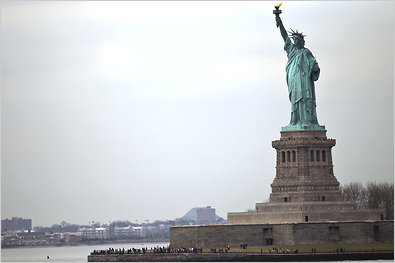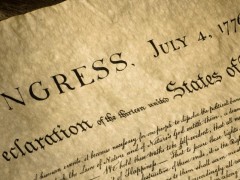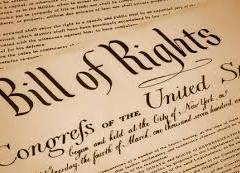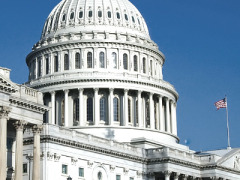The Right wing has stolen our liberty. Yes I know. Normally, the claim that “they took away our liberty” is something we would hear from the Right as an accusation against the Left. Liberty is their watch word; the banner under which they march; the concept they use to justify their political positions.* That really is my point. They constantly accuse us, liberals, of infringing on their liberties. They invoke liberty to protest taxes, big government, and limitations on free markets. If we talk about limitations on firearms or environmental regulations, they cry infringement of rights. For the Right, invoking “our liberty” is the same as “crying foul.” They claim to own the definition of liberty and any position that differs is just “socialism.” The Right has co-opted the concept of liberty and it is time for us to take it back.
The Left, for its part, has been too complacent in letting the Right dominate the concept of liberty. When the Right invokes liberty and rights, the Left invokes justice, fairness or equality. There is nothing wrong with that response per se. But in doing so we acquiesce to the Right’s definition of liberty. We allow them to assume a posture as if they are more in keeping with the founders’ values than are we.
Yet liberty does not mean what the Right says it means, neither in the American founding nor in the tradition of political philosophy that shaped our founding. They equate liberty with individual rights, protection of property and restrictions on government. They act as if any restriction on individuals is a violation of our liberties.
Yet liberty in society by its very nature implies limitation and restriction on me as an individual. My liberty means a limitation on you. Your liberty means a limitation on me. How so? If liberty means protection of “life, liberty and property,” then you cannot take my life, own my person, or steal my property. My liberty means restrictions on what you can do to me or things that belong to me. By the same token, your liberty means limitations on what I can do to you or things that belong to you. Limitation is thus paradoxically at the heart of liberty. My liberty is dependent on your restrictions and vice versa. The larger one person’s liberty, the more constrained is everyone else’s.
This may seem like a somewhat heady, philosophical point, which is probably why the Right has gotten away with their equation of liberty and limited government. But it’s the foundation for understanding how liberty is more than just the protection of my individual rights and properties. Liberty paradoxically emerges through a social agreement to restrain and limit ourselves. To live together, we give up some of the liberty we could otherwise have were we to live alone in nature or to live by our desires alone. We limit ourselves because we understand that life in society has benefits that come with a tradeoff. We must sacrifice some of our liberty to achieve life in society together. You can’t have a right to life, unless I cannot legally kill you. I can’t have a right to my liberty, unless you can’t enslave me. Rights thus come into existence only because we have come to an agreement to each limit and restrain ourselves. Sacrifice is thus the heart of liberty in society. We differentiate ourselves from nature by restraining our instincts and by achieving an agreement on a set of laws, even laws that we may not like.
The point is that the Right’s interpretation of Liberty as “freedom from restriction” is a distortion and one that the Left should resist. It ignores the sacrifice of freedom involved in the creation of liberty. Despite what the Right says, we are perfectly in keeping with the principles of liberty when we develop laws regulating the environment, when we want to raise taxes on those with wealth, when we wish to control guns, or create a system that guarantees healthcare for everyone. All of these policies are perfectly in keeping with the core of what liberty means, which is, to find ways to live together. It is the very essence of liberty to have the freedom to find the right balance between individual rights and responsibility to each other.
This difference between liberty alone in nature and “social liberty” was not lost on those modern philosophers of liberty who influenced the American founders. This is the way that John Locke, one of the most important modern philosophers of natural rights and government, put it a hundred years before Jefferson ever penned the Declaration:
Freedom then is not what Sir R. F.[Robert Filmer] tells us…”A liberty for every one to do what he lists [likes], to live as he pleases, and not to be tyed by an Laws:” But Freedom of Men under Government, is, to have a standing Rule to live by, common to every one of that Society, and made by the Legislative Power erected in it; A Liberty to follow my own Will in all things, where the Rule prescribes not: and not to be subject to the inconstant, uncertain, unknown, Arbitrary Will of another Man. (II ¶ 22)
Notes:
Some examples of conservative think tanks that make liberty central to their purpose and definition:
*The Cato Institute, as an example, describes itself as “a public policy research organization — a think tank – dedicated to the principles of individual liberty, limited government, free markets and peace.”
*FreedomWorks defines itself this way: “We are over 6 million Americans who are passionate about promoting free markets and individual liberty. Our members all share three common traits: a desire for less government, lower taxes, and more economic freedom.”




